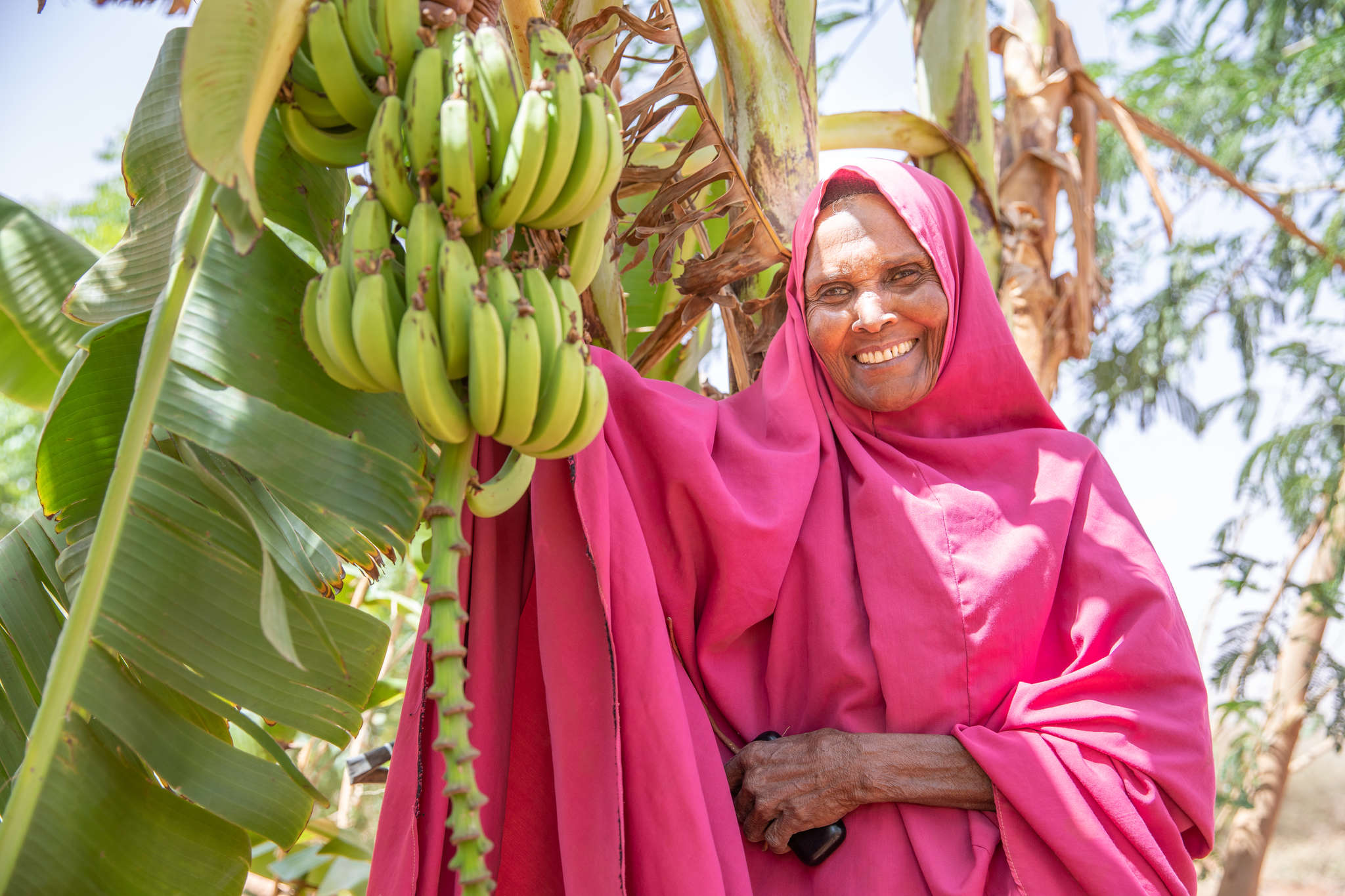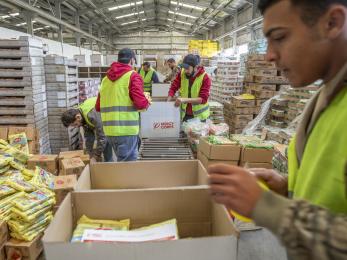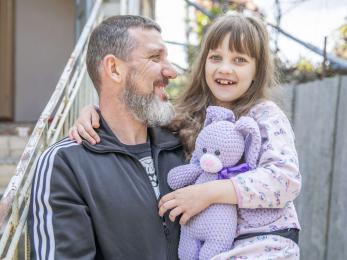8 important things Syrians have lost to four years of war
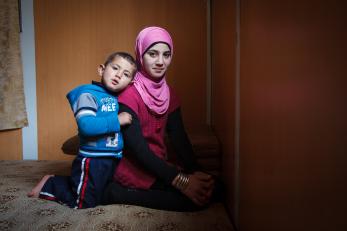
Editor's note: This article was originally published on June 15, 2015. The conflict in Syria has now raged on for eight years. For the most recent information on the situation, visit our Syria quick facts page.
The war in Syria is now four years old, and the massive conflict shows no signs of abating. There are 7.6 million people on-the-run inside Syria and nearly four million living in neighbouring countries. They have no idea when they’ll be able to return home in peace.
For now, they live in canvas refugee tents, leaky metal caravans or dilapidated buildings. They are far from home, missing school, friends, toys and all the comforts of the life they once had. We’re working across the region to help refugees find a sense of hope and community in their new homes.
Refugees face a mountain of challenges each and every day. The smallest things — taking a shower, getting to school, cooking a meal — require extra time and effort, and they are never taken for granted.
Learn more below about the daily challenges of refugee life, and what we’re doing to help.
Waking up to go to school
Currently, 68 per cent of Syrian refugee children and adolescents are not in school. In our work across the region, it’s something that we hear most often — refugees from ages six to 20 just want to be able to go to school and learn.
Classes are offered in formal refugee camps like Zaatari, but not all children can attend them. For refugees living in informal camps or within host communities, education is even harder to find. Sometimes there are no schools in the area, and other times young refugee children are turned away because of overcrowding.
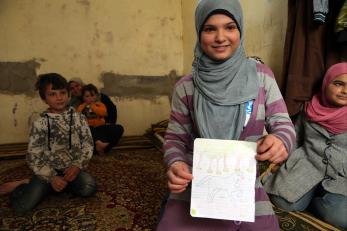
Houda, 13, lives in an abandoned cowshed in Lebanon with her family. “I haven’t been to school in over two years,” she says. “I was a very good student in Syria. I loved my school and miss going to class and seeing friends. I don’t have any freedom.”
What we're doing to help: Mercy Corps has created child-friendly spaces both inside camps and in host communities where refugee children can play, learn and participate in healing activities. We're also committed to helping the most vulnerable refugee children, including those with disabilities, get to school in the camps.
Clean drinking water
Jordan, which is host to more than half a million refugees, is one of the most water-scarce countries in the world. The huge influx of refugees has put a serious strain on the country’s aging water system. We’re helping rebuild it, but in the meantime, access to water can be limited.
For many Syrians, thinking about water as a scarce resource is a huge adjustment — they remember living in homes not long ago with plumbing and plenty of running water. But now, gathering it is a cumbersome chore.
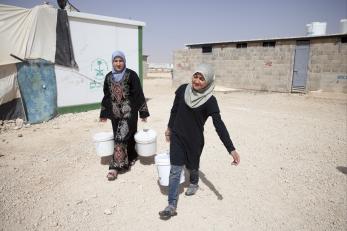
In Zaatari camp, 13-year-old Nour fetches water from the communal tap at least six times a day. The heavy buckets she carries back to her family’s tent make her tired and sore. The arduous trip is a constant reminder that she’s still a refugee. “I never would have imagined I’d be walking and standing in line to fill a bucket with water just to survive,” she says.
What we're doing to help: We've dug wells to serve Zaatari refugee camp, and our team of engineers is working to rehabilitate Jordan's aging water system so it's able to serve more people. We're also increasing access to clean water for refugees living in informal settlements across Lebanon.
Cooking a hot meal
Keeping a refugee family fed every day requires an immense amount of work. Families living in formal camps like Zaatari receive food vouchers that they can use at approved markets within the camp. A trip to the market often requires a half-hour walk and then a lengthy wait in line.
Because refugees have no refrigeration in their tents or caravans, they usually only buy canned goods and staple foods like bread, rice and beans. Traditional fresh foods and meat dishes are almost impossible to purchase and cook.
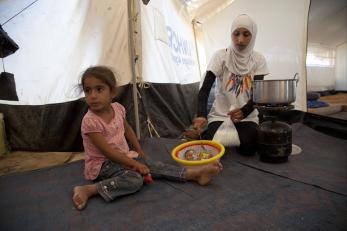
In fact, getting any cooking done at all is tricky. The camps used to have a few communal kitchens that offered stoves and cooking tools to refugees if they chose to wait in line to use them. But funding for that project has run dry, so now the only option for cooking is running small gas-canister stoves inside the refugee tents.
Families living in host communities must rely on family, friends, any income they can earn and organisations like Mercy Corps for food.
What we're doing to help: Providing cash assistance and vouchers allows families to buy what they need most. Just £23 can buy a whole family five food staples for the month, including rice, oil, tea and bread.
A safe shelter
Shelter is one life’s most basic necessities — everyone needs a safe place to sleep and protection from harsh weather. Refugee families live in a wide variety of structures and shelters that would often be considered unlivable.
The most common shelter in formal refugee camps is canvas tents, which are given to families when they arrive. If they have some money, they can purchase a “caravan” — a sturdier metal shelter — but even the caravans leak in the rain. Both options offer just one room, even for large families.
In host communities, some refugees take shelter with family or friends, but others must find unconventional places to live. In crowded and small Lebanon, refugees are turning old barns, cowsheds and chicken coops into temporary homes.
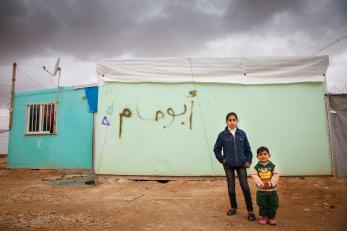
Winter brings more challenges. It’s commonplace for shelters to leak and tents to completely collapse due to wind. Noor, 11, hates the cold. “We drowned in the tent, water came in from everywhere,” she says. “But now the caravan leaks, too.”
What we're doing to help: Rehabilitating shelters for refugee families so that they are safer and warmer. This work includes repairing walls and installing sinks, doors, windows and water heaters.
The ability to work
Building a new life for your family is extraordinarily difficult without a job. Unfortunately for Syrian refugees, laws prohibit them from formally working in either Jordan or Lebanon.
Refugees are sometimes able to earn small amounts of income by “volunteering” in the camps or taking on odd jobs in host communities. But those meager earnings don’t go very far towards supporting an entire family. Even those living in old chicken coops have to cobble together enough money to pay rent.
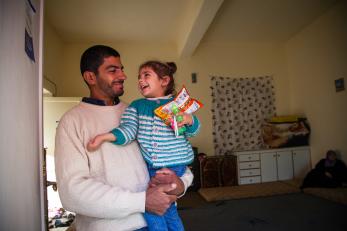
For parents, this limitation is especially hard. Khaled, a father of two young children, is trying to make ends meet in the town of Ajloun in Jordan. “I want to work, but it’s forbidden to work. The best thing I can do is go to shops, sweep the floors and in return get a couple of items to bring home,” he says. “The only thing I need is a job so I can provide for my family. That’s all I need.”
What we're doing to help: Cash assistance helps families survive with dignity by allowing them to purchase whatever their family needs most. With cash in hand, they can support local merchants and provide for their family by buying food, basic supplies or bigger items like heaters or stoves.
A warm home with electricity
When the cold winds and rains of winter arrive in the Middle East, many Syrian refugees have no source of warmth. Imagine suffering through winter with no heat, no electricity, and no jacket to keep you cozy and warm. That grim situation is a reality for many refugee families.
Both in and out of camps, electricity is hard to come by. If it’s available at all, it’s usually only for an hour or so each day. Because of this, most families must rely on fires or gas heaters for warmth. Fires inside homes or tents pose a health threat and obvious risk, but not everyone has a gas heater to rely on.
While the gas heaters don’t require electricity, they do require canisters — canisters that cost money to purchase. So winter is cold for refugee families, and thin tents, leaky caravans, or dilapidated structures do little to help.
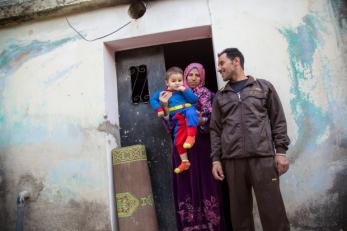
Amneh, who is seven-months pregnant and already has an 18-month-old, worries constantly about her family. “Here it gets really cold,” she says. “We as adults can handle that, but my child, I need him to be warm.”
What we're doing to help: Distributing warm clothing, blankets and boots to help people stay warm, and distributing gas heaters and fuel.
Playing with friends and toys
What do refugees miss the most about life in Syria? Children often tell us that they miss their school, their friends and the toys that they were forced to leave behind. For refugee children to have any sense of normality in their lives, they must be able to play.
We’ve worked hard to create playgrounds and child-friendly spaces in Jordan’s refugee camps, but refugees living in tent settlements or host communities don’t have the same opportunity to play each day. Many parents worry about the safety of their new neighbourhoods, so they keep the children inside.
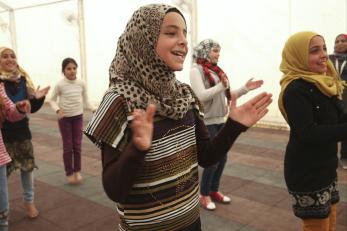
Duha, 12, comes to one of Mercy Corps’ child-friendly spaces in Zaatari to play. “Life here is hard. I miss my toys, my school and my friends,” she says. “Dancing and music makes me happy.”
What we're doing to help: Mercy Corps has child-friendly play spaces all over the region, including 13 just inside Zaatari camp. At those spaces, children and adolescents can play on the playground, take martial arts or wrestling classes, learn weightlifting, or participate in dance.
Planning for the future
Syrian refugees, particularly children and young people, have now lost four years of their lives to this brutal war. They have missed years of school and important life milestones, but perhaps most heartbreaking of all, they are missing a chance to create their own futures.
Families are learning to cope in refugee camps and host communities, but their lives have been put on pause. For young people, this reality is especially traumatic. Their hopes of having successful careers in their beloved home country have been tossed out the window, and now they’re not sure what to make of the future.
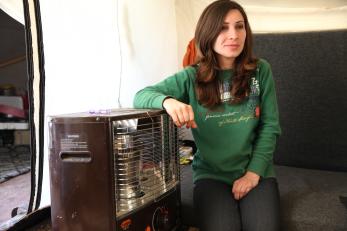
Zeena, 25, was a high-achieving university student before she fled the war and ended up in a refugee camp in Iraq. She had dreams of becoming a human rights lawyer someday. She’s become a young leader in the camp, but it’s clear that the war has devastated her future plans.
“Witnessing the tragedies of war has affected us all psychologically, especially the children and younger people,” she says. “Most people are tired, frustrated and becoming hopeless.”
What we're doing to help: Mercy Corps community and leadership trainings help Syrian refugees regain a sense of purpose in their lives, and encourage them to work together with others to resolve tensions and conflict.
As the war in Syria continues, we are committed to helping Syrian refugees recover and rebuild their lives as much as possible. While they can’t yet return home, we are helping them cope with their daily challenges and work together with their new neighbours.
